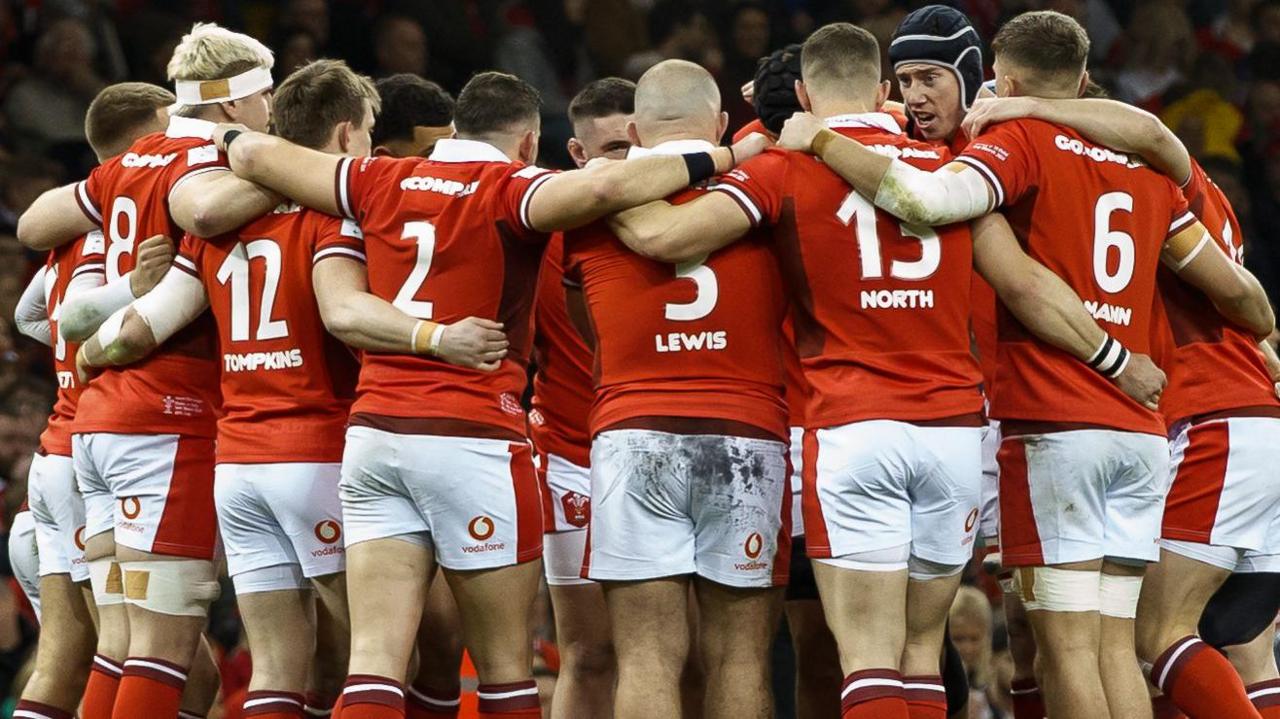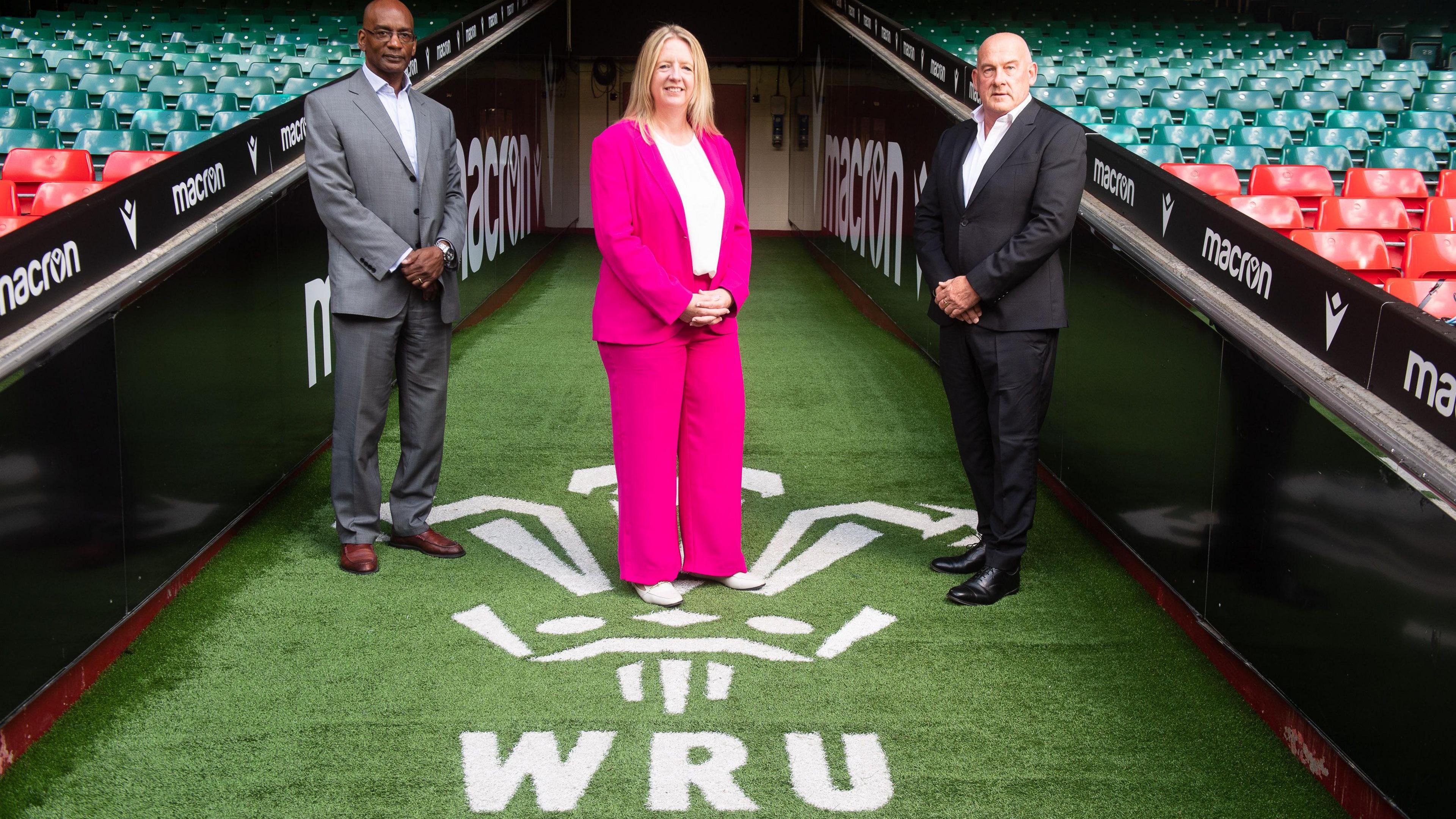Domestic duties over but long Welsh season drags on

Wales lost to Italy in the final Six Nations match in March 2024
- Published
Remember 24 September, 2023? That one night in Lyon. One glorious night.
The legion of Wales rugby fans who travelled will remember well how Warren Gatland's Wales humiliated Eddie Jones' Australia with a record 40-6 win to put themselves on course for a World Cup quarter-final against Argentina.
Yet from that point on, Welsh rugby has endured a steady decline which continued until the end of the domestic season.
Ospreys have provided a beacon of light, by reaching the United Rugby Championship (URC) play-offs before a quarter-final defeat by Munster on Friday.
Last season's woes included accusations of sexism and misogyny towards the Welsh Rugby Union (WRU) and the threat of a player strike for the Six Nations game against England.
This season's failings have been mainly about results.
Following the victory against Australia:
Wales' men's side lost to the Pumas in the World Cup quarter-final and suffered a clean sweep of defeats in the Six Nations to claim the Wooden Spoon for the first time since 2003, dropping to 10th in the world rankings in the process. The Wales Under-20s finished fifth in their tournament.
A year after finishing third, Wales' women's side emulated the men by propping up the Six Nations table, with only a final-day, last-gasp win against Italy to show for their efforts.
Of the Welsh teams, only Ospreys finished in the top eight of the URC, with the rest languishing in the lower reaches of the table. Cardiff ended the campaign in 12th, one place above Scarlets, while Dragons were 15th out of 16.
There will be no Welsh side in Europe's top competition next season for the first time, with Cardiff's Principality Stadium hosting the Champions Cup and Challenge Cup finals.
It has proved to be the season of struggle that most predicted given the financial constraints.
However you try to spin it, Welsh rugby remains in trouble. On and off the field. Former Wales centre Tom Shanklin told Scrum V it could get worse before it gets better.
With the regions' budgets getting squeezed further next season, it is hard to disagree.

Wales celebrate victory against Australia in the World Cup
Little domestic bliss
Survival might be the most significant achievement for the four Welsh professional sides this season.
Outgoing Dragons chief executive David Buttress outlined how close the Gwent region were to folding last summer.
It was a campaign in which Cardiff started pre-season with eight players, and where teams have had to train against each other because of small squad sizes.
Dragons head coach Dai Flanagan has been forced to fill a range of roles, including defence coach and head of recruitment.
The Welsh regions have been involved in 91 competitive fixtures this season, with 72 league games, 16 in Europe and an extra three for Ospreys in Challenge Cup and URC knockout stages.
They have 27 victories between them, with 12 of those against one of their Welsh counterparts.
Wins against Welsh sides account for more than half of the league wins of Ospreys, Cardiff, Scarlets and Dragons. Ospreys have won more games (14) than the other three regions combined (13).
No region has beaten a Scottish side and only Ospreys have defeated an Irish team, thanks to a last-minute drop-goal against Ulster.
Cardiff have only won against Welsh and South African opposition while Scarlets have only triumphed against fellow Welsh regions and Italian sides. No Welsh team beat Munster, Leinster, Connacht, Bulls, Glasgow or Edinburgh.
Dragons did not win an away game and have again been saved the humiliation of finishing bottom of the table by Zebre.
The Welsh regions' already modest squad salary budgets are reduced from £5.2m to £4.5m next season, so it is hard to expect improvement.
The signings for next term so far have predictably been underwhelming. Leinster, by contrast, have recruited New Zealand centre Jordie Barrett. The budgets are vastly different.
Booth's 'sense of pride' as Ospreys lose in play-offs
- Published8 June 2024
When a rest is as good as a change
- Published4 June 2024
The three Welsh regions more than ready for a break
- Published2 June 2024
Reasons to be hopeful

Toby Booth took over at Ospreys in 2020 and has guided his side to 14 wins in 25 games this season
You might be scratching your heads, but there are a few straws to clutch onto.
Ospreys have been the relative success story in the Welsh domestic game under the guidance of Toby Booth. They have defied the odds and risen above the pessimism.
They became the first Welsh side to reach the URC play-offs in six years and also reached the Challenge Cup quarter-finals.
The region are looking to relocate to St Helen's in Swansea or the Brewery Field in Bridgend for the 2025-26 season.
Crowds in Cardiff have been encouraging, particularly the European match against Bath, as supporters have identified with a side who have been involved in some exciting games and blooded young homegrown players.
This is despite a record of only four wins in 22 games, Cardiff's worst return since the inception of regional rugby in 2003, although 14 league bonus points indicate how many narrow defeats Matt Sherratt's side suffered.
Cardiff and Dragons are under new ownership while Scarlets finally appear to be doing something about their off-field management structure by bringing in somebody to help head coach Dwayne Peel.
The raft of international retirements over the last 12 months - which included Alun Wyn Jones, Justin Tipuric, Rhys Webb, Leigh Halfpenny, Ken Owens and George North - has also led to young players being exposed to regional and international rugby.
The hope is continued defeats will not scar this generation coming through, and that adversity will instead make them stronger.
Strategy incoming

Welsh Rugby Union executive director of rugby Nigel Walker, chief executive Abi Tierney and chair Richard Collier-Keywood are in charge of Welsh rugby
Welsh rugby will finally have a strategy by the end of June. That was the promise of chief executive Abi Tierney after she took over in January. She has since been talking to stakeholders and has enlisted the help of a consultancy firm.
Tierney has been quiet in public in the six months since she took over.
She can rightly claim to be gaining an idea of the challenge she has taken on but things have been deteriorating while the WRU has been evaluating.
Apathy towards rugby in Wales is a key concern, with only 20,000 fans turning up to the uninspiring Judgement Day double-header at Cardiff City Stadium on 1 June.
The lukewarm feelings many Welsh fans have towards the URC are an enduring issue.
Tierney has inherited the mess left by previous regimes but she knows she will be partly defined by what is produced in the report.
We wait to see if there is something revolutionary proposed to help solve the continuing malaise.
Executive director of rugby Nigel Walker suggested on the BBC's Scrum V show recently that cutting a region was still an option on the table.
Such a change next season is not expected at this point, not when the four sides are putting plans in place.
There is no short-term magic money tree. In fact, the WRU is tightening its belt.
Something decisive is required to change the course of the game in Wales because it has been allowed to decline over the last few years.
History will judge the WRU on its role in what has happened to the domestic game over the last decade or so. They will also be judged on what happens next.
Season rumbles on
Just when the players seem to have had enough, after 12 months on rugby's treadmill, there are still four Wales men's matches to come this summer, while Wales' women will face Spain in a WXV2 play-off on 29 June.
Gatland has named his squad to play against world champions South Africa at Twickenham on 22 June before a three-match tour of Australia in July.
There are Test matches against the Wallabies on 6 July in Sydney and Melbourne seven days later before a friendly against Queensland Reds in Brisbane on 19 July.
Wales have a chance to salvage something from the season by achieving something special Down Under, which would restore that feelgood factor of nine months ago.
Australia, under new coach Joe Schmidt, will have a chance to avenge that night in Lyon.
So despite domestic duties being completed, this season rumbles on.